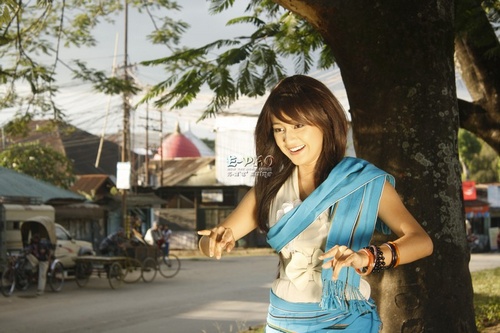Manipuri Cinema, a world within a world Cinema
Manipuri film as a tool for social integration
Bobby Wahengbam *

A scene from 'Yaiskulgee Pakhang Angaoba'
Unlike the Bollywood counterpart, the Manipuri films which are basically made by the Meiteis in the Lingui Franca Manipuri dialect have never shown other aboriginals including the Nagas and the Kukis in bad light. Films always try to bring the ethnic groups together as a rule set up by the inner concise of the creators.
- Bobby Wahengbam
Though Bollywood has been a major media tool to propagate national integration particularly the unity between the Hindus and the Muslims, due care is not taken when it deals with regions like the South Indian States and the North East. A great amount of ignorance, negligence and apathy towards the North East is vividly evident in a film entitled "Tango Charlie" which misleads the viewers. "It'll be even worse if the misleading is done intentionally", Professor Bimol Akoijam viewed.
Unlike the Bollywood counterpart, the Manipuri films which are basically made by the Meiteis in the Lingui Franca Manipuri dialect have never shown other aboriginals including the Nagas and the Kukis in bad light. Films always try to bring the ethnic groups together as a rule set up by the inner concise of the creators. But it can't shy away from the tradition of looking things that the hero will be from the Meitei Community and the Heroine from other ethnic groups probably from the hills.
Some of the films in this line are 'Doctor Yaima' directed by Homen D Wai, 'Paokhum' by Bishwamitra, 'Keishamthong Thoibi' by O Gautam,'Pirangna Eigi Marupni' by Bhogen. Luckily, a reverse in the trend is evident in films like 'Abir Khan' by Pilu (remake of a highly popular Sumang Leela of the same title and 'School Karusi' by Yoimayai.
In 'School Karusi', a Christian boy proposes a Brahman girl who is his classmate. When the girl brings out the issue of social barrier, he pricks blood from both of them and asks which blood drop belongs to Christian and which one to Hindu. It reflects how the young minds feel about the social barrier that is literally tearing the state apart.
Secular concept from Keishamthonggi Thoibi (2008, O Gautam) to Yaishkulgi Pakhang Angaoba (2011, Homen D'wai).
Kabui is an ethnic minority but aboriginal group of people who scattered around Imphal in small localities and settled mainly in Tamenglong district. They are the closest tribe to the Meiteis and intermarriage between the two is common. Kabui Salang Maiba is an important figure in the legendary love story 'Khamba Thoibi'.
In films also, their presence is felt. And such film propagates the concept of secularism. In 'Keishamthong Thoibi'(2008), a Kabui girl got married to a Manipuri Brahman. It is the journey of her from isolation to the final acceptance by the orthodox father- in- law. It shows that humanity prevails over communal and religious differences. But, it is the Kabui woman who adjusts to the new environment.
The secularism seems to be one sided in the form of small community adjusting to the major community. After three years since 'Keishamthongi Thoibi', the concept of secularism has changed dramatically in "Yaishkulgi Pakhang Angaoba" (2011). The heroine is now the play maker. She is modern, bold and traditional at equal ease.
Romance between her and a Meitei pakhang is a very sensitive issue. The creator skilfully balances and underplays the caste differences. The difference can be felt only by the local people. The skill handling of the maker of the film is worth praising for. No footage is given to communal discourse but it limits itself to be just a romantic comedy.
The heroine is only flirting like any other girl of today to the shock of the simpleton hero. The communal difference is underplay and sunk deep in the last scene. It is not a 'Romeo and Juliet' or 'Qayamat Se Qayamat Tak' to define true love as above sectional hatred. It is a reality of a local situation where the writer attempts to erase the communal gap. It is not enough to present a conventional statement that true innocent lovers triumph over sectarian conflict.
He strongly makes the audience feel that social/professional/economic status is above all the differences. Doctor is the most sought and respected profession in Manipur. All section of people cognitively feel that there will be no more hurdle between the two innocent souls if the hero can attain a high social position by becoming a physician. That is very vocal at the very end of the film.
And it seems to be the best way out to solve the problem of communal gap. Yes, for the respectable and financially sound professional, the communal barrier is not a reality. If it is, it is for a short moment to formally respect the so called man made 'community'. The film brings out a modern and practical concept of secularism.
The best thing about the film is the director's ability to create a great film for the masses by compromising the limitless limits and pleasing all concerned at the same time. He compromises the limitation of the budget weakening the production value which the audiences are unmindful about as far as it entertains them.
And equal credit should be given to the two main artistes (Bala and Bonny) for their mindboggling stark performances.
'Yaishkulgi Pakhang Angaoba', is a successful Manipuri Romcom. Songs help the above concept as the director skilfully composed two super hit songs based on Kabui folk tradition. The songs are truly cool and a lot of fun.
